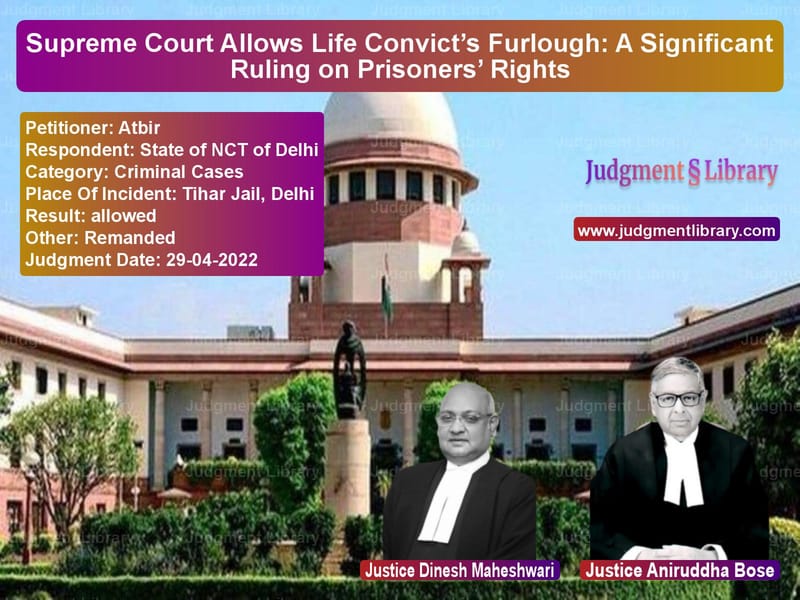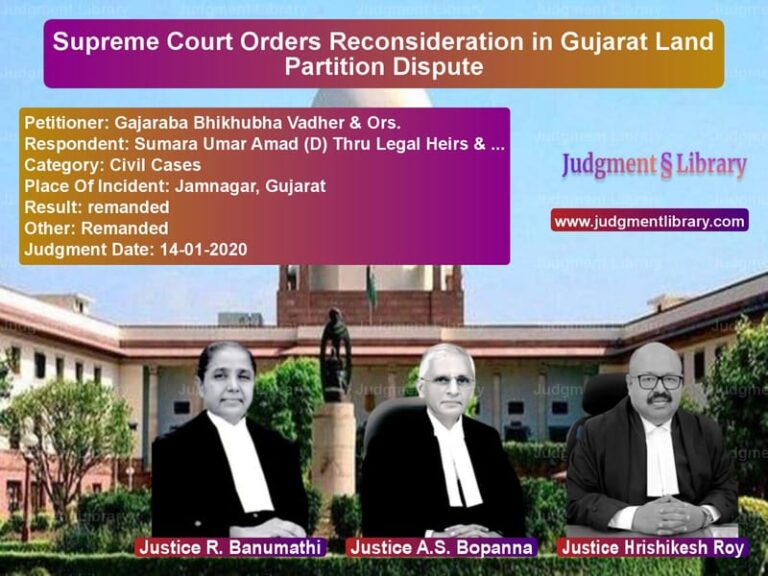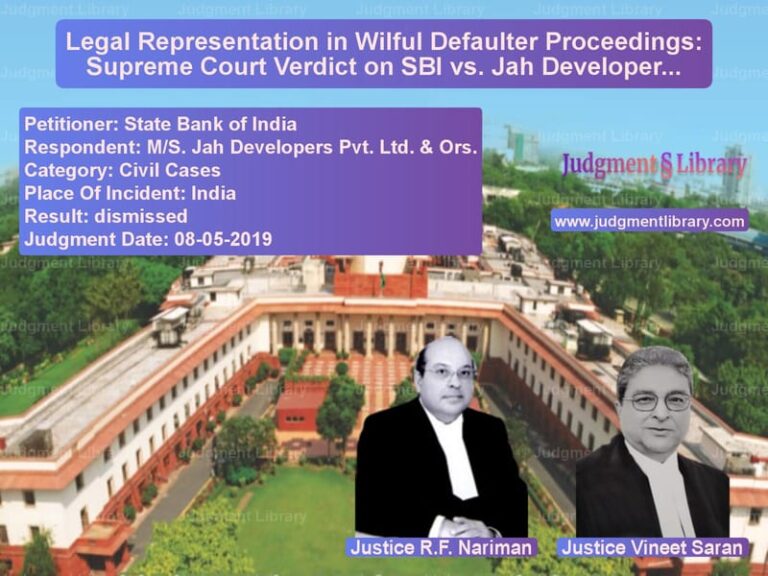Supreme Court Allows Life Convict’s Furlough: A Significant Ruling on Prisoners’ Rights
The Supreme Court of India, in the case of Atbir vs. State of NCT of Delhi, ruled in favor of the appellant, a life convict, by allowing his furlough application and setting aside previous denials from the prison authorities and the Delhi High Court. This ruling reinforces the rights of life convicts to seek furlough as an incentive for good behavior, even when their sentences prohibit parole and remission.
The Court emphasized that an order issued by the President of India commuted the appellant’s death sentence to life imprisonment but did not explicitly bar furlough. The judgment highlights the importance of maintaining a reformative approach to incarceration, ensuring that prisoners are incentivized to maintain good conduct in jail.
Background of the Case
Atbir was convicted under Section 302 of the Indian Penal Code for committing a triple murder. The trial court sentenced him to death, which was later confirmed by the Delhi High Court and the Supreme Court. After exhausting all legal remedies, Atbir submitted a mercy petition to the President of India. On November 15, 2012, the President commuted his death sentence to life imprisonment with the condition that he would remain in prison for the rest of his natural life without parole or remission.
Despite these conditions, Atbir applied for furlough under the Delhi Prison Rules, 2018, citing his good conduct in jail. His application was rejected by the Director General of Prisons, which was later upheld by the Delhi High Court. Atbir then appealed to the Supreme Court.
Petitioner’s Arguments
Atbir’s legal counsel argued that:
- Furlough is distinct from parole and remission and was not explicitly barred by the President’s commutation order.
- Under Rule 1223 of the Delhi Prison Rules, prisoners who maintain good conduct are entitled to furlough.
- Atbir had earned favorable conduct reports and certificates of appreciation from the jail authorities.
- The High Court incorrectly interpreted the President’s order to deny him furlough.
- Denying furlough would defeat the purpose of the reformation and rehabilitation of prisoners.
Respondent’s Arguments
The State of NCT of Delhi, represented by the Additional Solicitor General, opposed the plea on the following grounds:
- The President’s order clearly stated that Atbir would not be entitled to parole or remission.
- Furlough is a form of remission in the execution of the sentence, making it impermissible in this case.
- The seriousness of the offense committed by Atbir made him ineligible for furlough under Rule 1225 of the Delhi Prison Rules.
- The Delhi High Court had correctly relied on previous rulings that life convicts with restrictions on remission could not claim furlough.
Supreme Court’s Judgment
The Supreme Court, comprising Justices Dinesh Maheshwari and Aniruddha Bose, ruled in favor of Atbir, setting aside the rejection of his furlough application. The key observations of the Court were:
- Distinction Between Furlough and Parole: The Court clarified that furlough is an incentive for good conduct, while parole is a temporary release granted under specific circumstances. Since the President’s order barred parole but not furlough, the denial was unjustified.
- Purpose of Furlough: The Court emphasized that furlough helps maintain discipline in prisons and is part of the reformative aspect of the penal system.
- Good Conduct in Prison: The Court noted that Atbir had received positive conduct reports and that refusing furlough could be counterproductive to maintaining discipline.
- Application of Delhi Prison Rules: The Court stated that Rule 1223, which allows furlough for well-behaved prisoners, was applicable in this case.
- Remand for Fresh Consideration: Instead of directly granting furlough, the Court directed prison authorities to reconsider Atbir’s application on its merits.
Implications of the Judgment
This ruling has significant implications for prisoner rights and jail administration:
- Reinforcing Reformative Justice: The judgment upholds the principle that imprisonment should focus on reformation rather than mere retribution.
- Judicial Oversight on Prison Rules: The Supreme Court’s intervention ensures that prison authorities apply rules fairly and in line with constitutional principles.
- Setting a Precedent for Life Convicts: The case clarifies that life convicts with restrictions on parole can still be eligible for furlough if their prison conduct justifies it.
- Encouraging Good Behavior in Prisons: By ensuring that well-behaved prisoners receive furlough, the ruling promotes discipline within the prison system.
Conclusion
The Supreme Court’s verdict in Atbir vs. State of NCT of Delhi is a landmark ruling that strengthens the rights of life convicts. The decision highlights the difference between parole and furlough and ensures that prisoners who maintain good conduct are rewarded. This judgment is expected to influence future cases concerning the rights of prisoners serving life sentences.
Petitioner Name: Atbir.Respondent Name: State of NCT of Delhi.Judgment By: Justice Dinesh Maheshwari, Justice Aniruddha Bose.Place Of Incident: Tihar Jail, Delhi.Judgment Date: 29-04-2022.
Don’t miss out on the full details! Download the complete judgment in PDF format below and gain valuable insights instantly!
Download Judgment: atbir-vs-state-of-nct-of-delh-supreme-court-of-india-judgment-dated-29-04-2022.pdf
Directly Download Judgment: Directly download this Judgment
See all petitions in Bail and Anticipatory Bail
See all petitions in Custodial Deaths and Police Misconduct
See all petitions in Attempt to Murder Cases
See all petitions in Judgment by Dinesh Maheshwari
See all petitions in Judgment by Aniruddha Bose
See all petitions in allowed
See all petitions in Remanded
See all petitions in supreme court of India judgments April 2022
See all petitions in 2022 judgments
See all posts in Criminal Cases Category
See all allowed petitions in Criminal Cases Category
See all Dismissed petitions in Criminal Cases Category
See all partially allowed petitions in Criminal Cases Category







